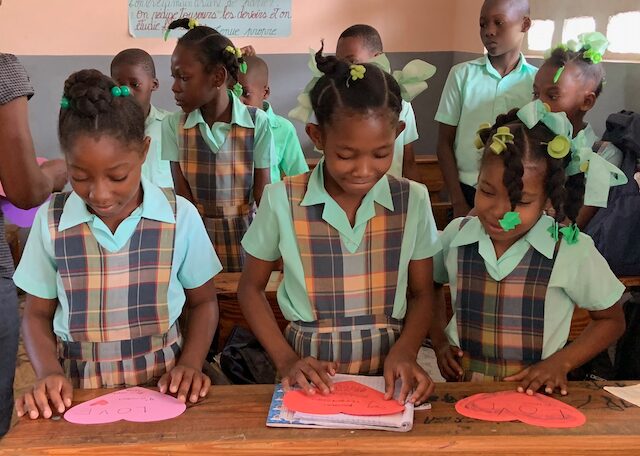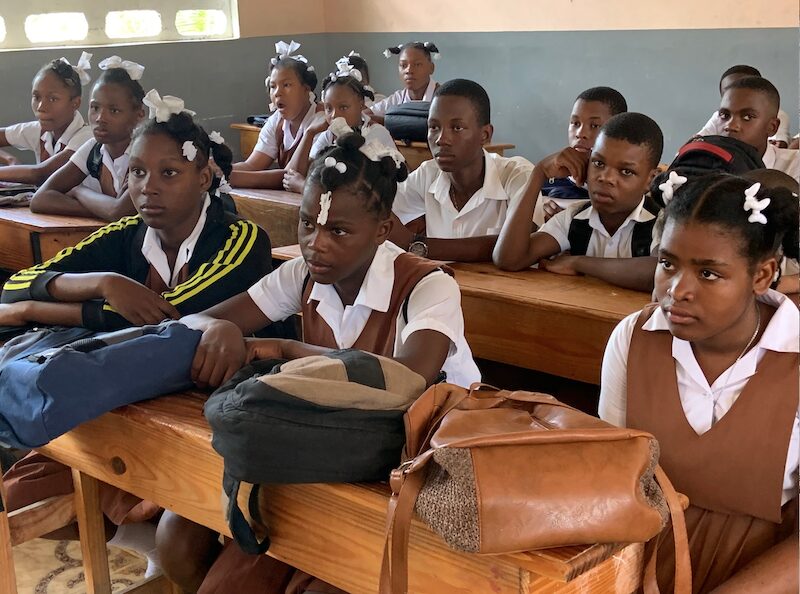It’s a letter filled with words of encouragement from Lascahobas, Haiti, to Mechanicsville.
It’s a photograph of Beatrice Sanon standing at the front door of a new home, painted in sunny citrus tones, with clean, white trim.
It’s a phone call from Roanoke to Papaye, filled with a hundred “bisous.”
These everyday exchanges help to keep the twinned parishes of the Diocese of Richmond and the Diocese of Hinche united, both in their mission and in their faith, despite the turmoil that has engulfed Haiti since the July 2021 assassination of President Jovenel Moïse.
“It’s been a tumultuous few years,” said Diane Atkins, chair of the diocesan Haiti Ministry Commission. “Now, the danger is greater than ever before.”
The airport has been closed. A few weeks ago, gangs attacked the port, setting shipments on fire. “That was devastating to the rest of Haiti,” she said.
“Even though the news is full of violence, there are pockets of beautiful things happening,” Atkins said. “There are Haitians full of faith and resiliency who are trying to keep going.”
Around 50 parishes in our diocese are twinned with parishes in Haiti, most of which are in the Diocese of Hinche, located in Haiti’s Central Plateau.
“The overall goal of Haiti Ministry is sustainability, for the parishes to become independent,” explained Tina Wandersee, director of the diocesan Office of Social Ministries.
Although there has been limited travel between the two nations, the diocesan Haiti Ministry Commission along with its teams – the Haiti Healthcare Support Team and the Haiti Education Support Team – has continued to work with advisors in Haiti, largely through virtual meetings via Zoom.
“We look to those in Haiti for leadership,” Wandersee said, “and we stand in solidarity with them. We pray for the people of Haiti, and most of all, for the conversion of the gangs, that they may lay down their arms.”
‘Don’t get discouraged’
Each year during Advent, Church of the Redeemer, Mechanicsville, holds an event called ‘No Room at the Inn,’ in support of those in need of housing.
“Parishioners loan us their treasured nativities, along with a little note about why theirs is special to them,” said Atkins, who also serves as outreach and pastoral care minster at the parish. “It’s a beautiful evening.”
Half of the money raised goes to local organizations, and half goes to the Association of Female Activists in Lascahobas (AFAL), with whom Church of the Redeemer has been twinned since 1996. The women’s group started a school, offers reading classes for adults, and manages a microbank offering low-interest loans.
AFAL leaders also identify those in their community who are most in need of new homes.
Church of the Redeemer funds the construction and AFAL hires local contractors who buy supplies locally, helping the economy of Lascahobas on three fronts: shops get customers, craftsmen gain employment, and a family receives a new home.
The ministry has built 50 houses over the last 15 years.
“We were worried, with everything that is going on, that construction would slow down,” Atkins said. “But just a week ago, we got pictures of the latest house to be built and a letter from another woman who had recently moved into a new home. We were so excited.”
“Thank you for Sister and the Church and the whole group for the steps they took to help us,” the letter reads. “I was living in a leaky house, and you helped me with a beautiful one. I thank you, and I thank God. Many thanks to you all. … Some of us are still in need, but please don’t get discouraged. Again, thank you.”
‘To hear someone’s voice’
In February 2012, Clermann Dieudonne took her first trip as part of the Haiti Ministry of Our Lady of Nazareth, Roanoke, to visit Papaye Normal School, a teacher’s college with whom the parish has been twinned since 1989.
Accompanying her was her 16-year-old son, Tamir, who was given a video camera for the occasion to record the trip for the youth ministry.
“He was very excited for the trip and, of course, [that] I was taking him out of school,” Dieudonne said, laughing.
Born in Haiti, Dieudonne has lived in the U.S. for nearly 40 years. She said she enjoyed working as an interpreter on the trip so much that she now also serves on the diocesan Haiti Ministry Commission.
“I am a social butterfly. I love people, and on top of that, I’m from Haiti, and we’ve never met a stranger,” she said.
She recently facilitated a phone call between the Haiti Ministry of Our Lady of Nazareth and Sister Adele, director of the college in Papaye.
“She told us that school continues to function in Hinche. It’s quiet compared to what’s going on in Port-au-Prince, but there are many difficulties,” Dieudonne said.
Even simple things, such as a bag of rice, are becoming far more expensive because of the hardships people face in getting it from one point to the next, Dieudonne said.
“Sister was so happy to speak with us. She sent so many ‘bisous,’ which is to say many kisses to you all,” she said.
“There are so many ways to communicate – email, What’s App,” Dieudonne said, “but it’s very good to hear someone’s voice.”
‘Do not be afraid’
“Do not be afraid. I believe that phrase is repeated around 365 times in the Bible,” said Patricia Britz, chair of Haiti Twinning Ministry at Sacred Heart, Norfolk.
The refrain serves as a reminder of God’s love and assurance to his people, she said, especially in difficult times.
Over the past few years, Sacred Heart and its sister parish, St. Gabriel, Lascahobas, have worked to keep up a friendship that began in 2007, communicating through Zoom and exchanging photos and greeting cards via What’s App.
“Whenever a door or window closes, another opens,” Britz said.
Sacred Heart’s Haiti Ministry has also continued its support of St. Gabriel School.
Groundbreaking for the school began in March 2010. “They set to work just a few weeks after the earthquake in Port-au-Prince,” Britz said. “Can you imagine?”
She recalled that Father Bernard Desras, pastor of St. Gabriel at the time, said, “In this tragic time, we need a common project to bring hope to the community.”
Today, St. Gabriel School offers classes from preschool through grade 13, serving 745 students.

“The teachers have empowered the students to become young adults who will make good decisions for their community,” Britz said.
The ministry has been blessed, Britz said, with supportive pastoral leadership and with dedicated volunteers. She also credits the ministry’s success to its adherence to a five-year plan, which includes teachers’ salaries, sustainable projects, student lunches, medical assistance and scholarships.
“The goal is for the school to become self-sustaining, through attracting more paying parents,” she said.
Ultimately, the heart of Haiti Ministry reaches beyond construction projects and school lunches, she said, to friendship, solidarity, and faith.
“Haiti Ministry is about building relationships,” Britz said. “When you love someone, you find a way to communicate. Love is like water. It goes where it needs to go.”
Donate to the Haiti Education Support Team.

